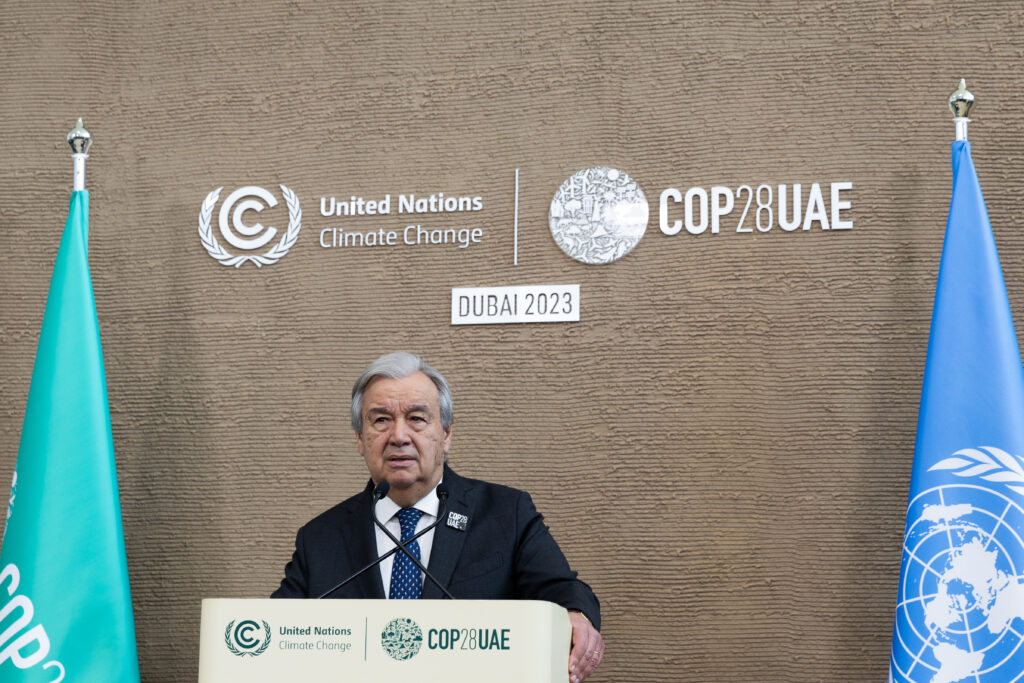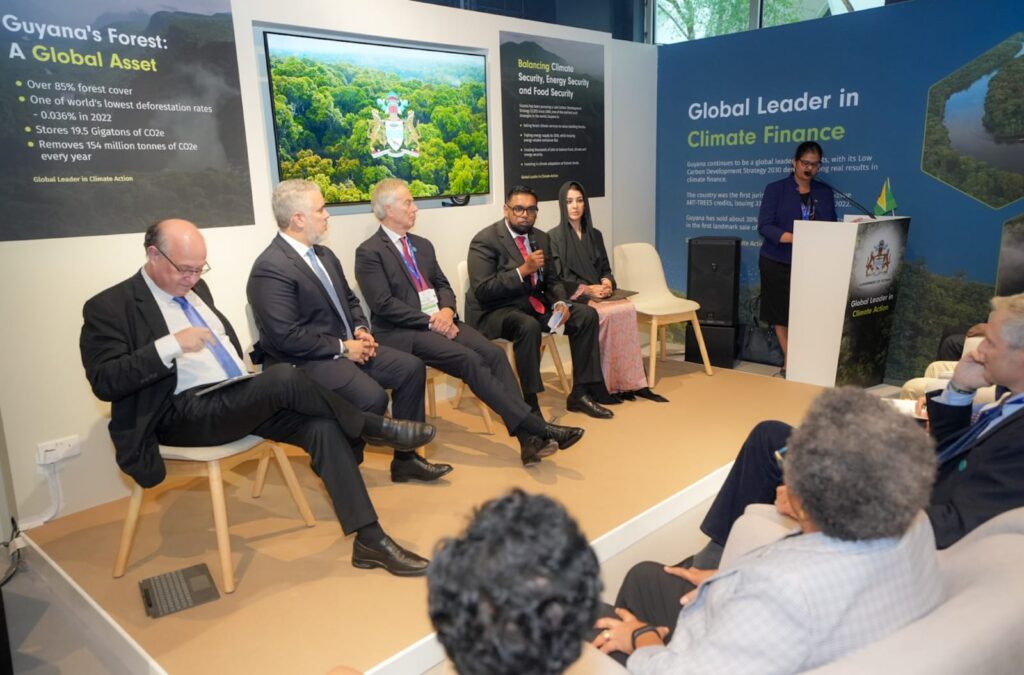
‘Heated’ debate on fossil fuels as COP28 winds down
By Vishani Ragobeer in Dubai
Fossils fuels- the main contributor to the climate crisis- were always going to be the hot topic at this year’s global climate talks in Dubai, COP28, with sweltering temperatures making 2023 the hottest year on record. But as the end of the conference draws nearer with a new draft agreement released, fiery debates have taken over the conference.
On Monday night (Dubai time), a new text for the Global Stocktake (GST) was released after negotiators from Guyana and other countries spent days hammering out how best to satisfy everyone.
The GST is a global inventory of sorts that shows how climate goals are unfolding. And the draft text said countries (called Parties) were called upon to take several actions that would reduce greenhouse gas emissions.
Those emissions include carbon dioxide, a harmful gas produced when fossil fuels like oil and diesel are burnt. When that gas is produced, it goes into the atmosphere and leads to global warming.
And countries were told that they could take actions ranging from tripling renewable energy use (that is, using more environmentally-friendly energy sources like solar energy or hydropower) to reduce both the production and use of fossil fuels in a “just orderly and equitable” manner.
BREAKING new #COP28 stocktake text
Fossil fuel “phase out” is GONE
Whole energy package is loose “actions that cld inc”
➡️refs renewables, CCS for “efforts twds substitution of unabated fossil fuels”
➡️loose 2050 timeline
➡️no methane targethttps://t.co/JxxCbuHUIu pic.twitter.com/3qA5BnWUfN— Simon Evans (@DrSimEvans) December 11, 2023
That sent the Expo City, Dubai, venue into a frenzy.
Outside the media centre, there were huddles of disappointed stakeholders, be it those from non-governmental organisations or intergovernmental bodies like the Alliance of Small Island States (AOSIS).
“It is completely insufficient,” said Samoa’s Minister of Natural Resources and the Environment, Toeolesulusulu Cedric Schuster.
Samoa currently chairs AOSIS, a grouping of 39 states, including Guyana.
Minister Schuster said the current agreement does little to keep the goal of limiting global warming to 1.5 degrees celsius in reach. If that goal isn’t maintained, he explained, small, vulnerable countries will not fare well with some even threatened by disappearance due to rising sea-levels.

So he said, “We cannot sign onto text that does not have strong language on phasing out fossil fuels. How can you not understand it is our very lives that are at stake?”
The climate conference is not done yet and a final agreement is still expected to be issued by the COP28 President, Sultan Al Jaber.
And final agreement from COP28 to phase-out (that is, radically eliminate fossil fuel use) or phase-down (reduce the use of fossil fuels)- as was being considered before this draft text- seems to be one of the key indicators of success at this conference.
Secretary General of the United Nations, António Guterres, certainly thinks so.
“… a central aspect in my opinion of the success of the COP would be for the COP to reach a consensus on the need to phase out fossil fuels in line with a time frame in line with the 1.5 degree limit,” he said at a briefing on Monday morning in Dubai.

But Guterres doesn’t believe that everyone must carry the same burden of solving the climate crisis by reducing their fossil fuel production or use.
“It doesn’t mean that all countries must phase-out fossil fuels at the same time, the principle of ‘common but differentiated responsibilities’ apply but it means that globally, the phase-out of fossil fuels needs to be compatible with net zero in 2050 and the limit of 1.5 degrees in temperature rise,” Guterres added.
These statements are particularly important for countries like Guyana which are now getting into or expanding their fossil fuel sectors but are also vulnerable to the climate crisis.
Guyana is a nascent oil and gas producer and according to the International Energy Agency’s (IEA) World Energy Outlook published in December 2023 report, it will have the largest global increase in oil production from 2022 to 2035.
The country started producing oil in December 2019 after attractive quality and quantity of oil was found in its offshore Stabroek Block in 2015.
And the small South American country’s argument has been that it has a right to exploit these oil and gas resources to fund its development needs, including infrastructure like sea walls and irrigation systems needed to withstand the harsh effects of the climate crisis like rising sea levels and flooding.

“We have made it very clear that we are going to develop the sector,” Guyana’s President, Dr. Irfaan Ali said during a Guyana side event for COP28 in Dubai.
Guyana, at COP28, has also championed the value of forests as a key solution to the climate crisis since these forests help to trap the harmful carbon dioxide. For its part, Guyana’s 18.5 million hectares of intact forests will trap way more carbon dioxide than is produced by the country’s oil sector.
Even at peak oil production (which is expected to be 1.6 million barrels of oil produced daily), the country’s Vice President Dr. Bharrat Jagdeo explained that carbon dioxide emission would only be about 20% of the 154 million tonnes of carbon trapped by Guyana’s trees.
“We would still be nationally, carbon negative,” Jagdeo said.
So while countries and bodies try to get a better outcome here at COP28, Guyana already believes it is playing its part in protecting the environment with its trees while harnessing the fossil fuels it believes it needs to fund local development.
This story was published with the support of Climate Tracker through the COP28 Climate Justice Reporting Fellowship.




